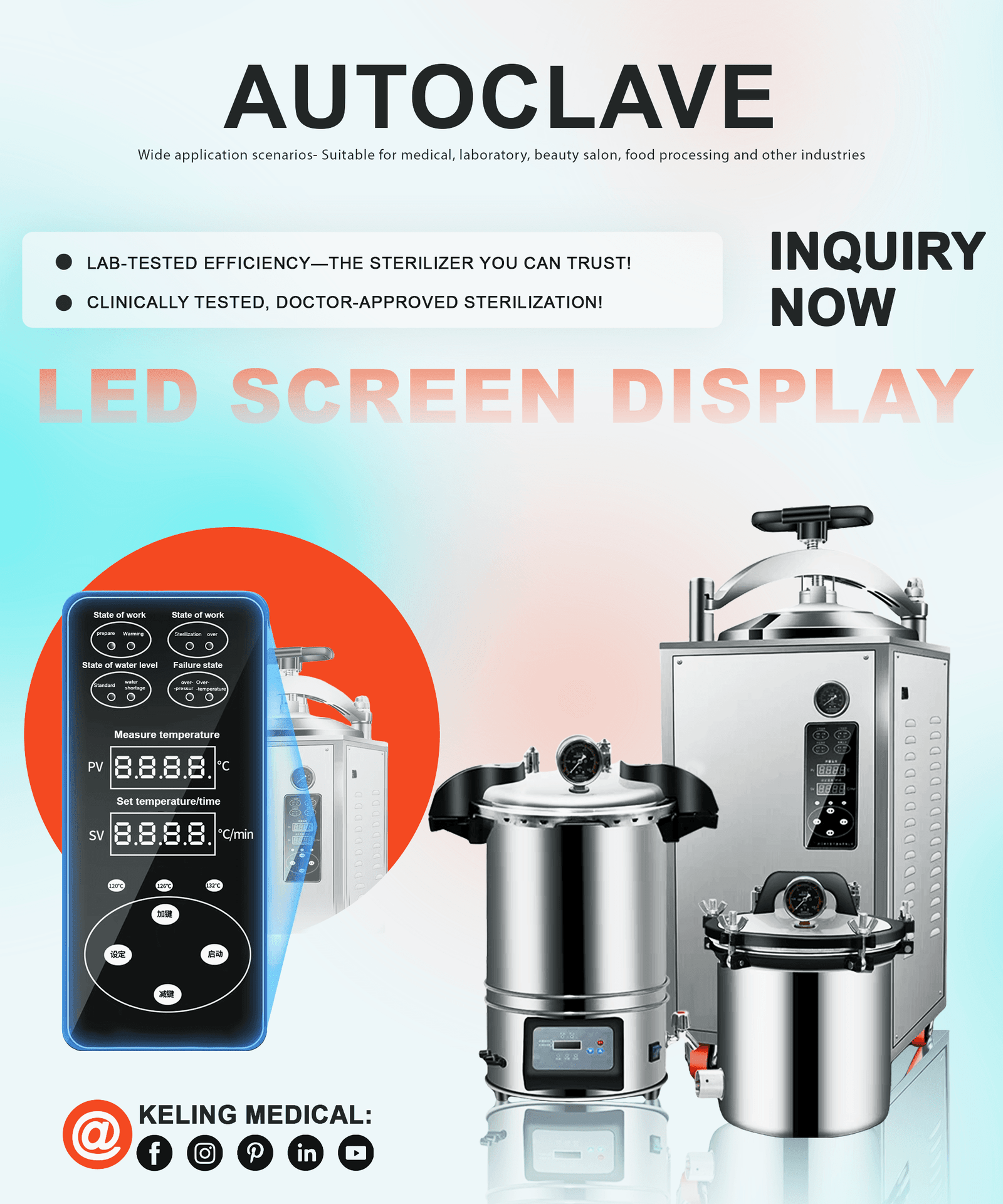
This article delivers practical solutions to the top questions about autoclaves used in agricultural settings. This guide covers all your needs whether you want to invest in an autoclave or learn about its agricultural applications.
Autoclaves employ high-pressure steam to sterilize equipment, tools, soil and additional materials. Autoclaves eradicate harmful bacteria, fungi, viruses and other microorganisms by subjecting items to extreme heat and pressure.
Applications in Agriculture:
Sterilizing farming tools and equipment.
Treating soil to remove pathogens.
Autoclaves help maintain crop growth areas that are both safe and clean.
Autoclaves sterilize objects through the application of pressurized steam. Here’s a simple breakdown of the process:
Items are placed inside the autoclave chamber.
The chamber becomes airtight while air evacuation creates a vacuum.
The autoclave chamber reaches sterilization temperatures of 121-134°C (250-273°F) by using high-pressure steam.
The steam penetrates the items, killing microorganisms.
Once the sterilization cycle ends the chamber temperature lowers allowing safe use of sterilized materials.
Why Steam? Steam provides a highly efficient sterilization method because it quickly and uniformly distributes heat throughout the items.
Autoclaves provide an effective and safe sterilization method suitable for organic farming practices. Steam sterilization methods align with organic farming principles because they avoid chemical use.
Benefits for Organic Farmers:
Eliminates the need for chemical-based sterilization.
Prevents the spread of soil-borne diseases.
Promotes healthier crops without compromising organic certifications.
Several factors determine the agricultural cost of using an autoclave with type, size, and features being primary considerations. Below is an overview of the costs:
Initial Purchase:
Portable autoclaves: $1,000 – $5,000
Large-scale autoclaves: $10,000 – $50,000 or more
Operational Costs:
Autoclaves today consume less energy which makes them cheaper to operate in terms of electricity expenses.
Regular cleaning and inspections remain essential for maintenance while not creating significant financial burdens.
Long-Term Savings:
Reduces crop losses due to contamination.
Minimizes reliance on chemical treatments.
An autoclave can operate for 10-15 years or longer when maintained correctly. The lifespan of an autoclave depends heavily on how often it’s used, how well it’s built and how regularly maintenance is performed.
Autoclaves provide a highly effective method for sterilizing soil. Autoclaves sterilize soil by removing pathogens and weed seeds and destroying pests using heat instead of chemicals.
How It Works:
Heat-resistant containers containing soil are loaded into the autoclave for sterilization.
The sterilization process eliminates dangerous microorganisms to produce clean planting soil.
Benefits:
Improves soil health and crop yield.
Reduces the risk of disease transmission.
The design of modern autoclaves includes user-friendly interfaces that ensure simple operation. Most models feature:
Digital displays for monitoring temperature and pressure.
Pre-programmed cycles for different materials.
Safety mechanisms to prevent accidents.
Manufacturers give detailed instructions and training for users who are new to operating autoclaves.
Begin using agricultural autoclaves effectively by adhering to these start-up tips.
Evaluate your operational requirements such as tool sterilization and soil treatment.
Evaluate the operational requirements to decide on the necessary size and capacity of your equipment.
Learn about all the functions and controls of your autoclave.
Follow the manufacturer’s guidelines for safe operation.
Use heat-resistant containers for soil or tools.
To achieve effective sterilization results keep the contents of the chamber below full capacity.
To prevent mineral deposits from forming inside the chamber use distilled or deionized water.
Clean the chamber after each use.
Inspect seals, valves, and gauges regularly.
Autoclaves represent powerful tools which can transform agriculture by sterilizing tools, equipment and soil. These tools maintain safety standards for organic farming while proving economical over time and becoming simple to operate after appropriate training.
This guide addresses common questions and concerns to help agricultural professionals and farmers comprehend the practical benefits of using autoclaves.
Contact us today for expert advice on selecting the perfect autoclave model or if you are prepared to make your autoclave investment.
Yes, large-scale autoclaves are designed to handle high volumes of tools, equipment, and soil, making them ideal for commercial farming operations.
Yes, autoclaves are eco-friendly as they use steam for sterilization, eliminating the need for harmful chemicals.
Routine maintenance, such as cleaning and inspections, should be performed after each use. Annual servicing is recommended to ensure optimal performance.
Modern autoclaves include safety features like automatic pressure release valves, secure locking mechanisms, and overheat protection systems.
You can purchase high-quality autoclaves from Keling Medical. Contact us via email at inquiry@shkeling.com, WhatsApp at +8618221822482, or visit our website at https://autoclaveequipment.com/.
For more information or to find the perfect autoclave for your agricultural needs, reach out to us today:
Email: inquiry@shkeling.com
WhatsApp: +8618221822482
Website: https://autoclaveequipment.com/
Let us help you take your agricultural operations to the next level!

The autoclaving process serves as an essential sterilization practice utilized across medical, laboratory, and research facilities to protect glassware and instruments through effective sterilization. High-pressure steam eliminates pathogens during this

The autoclaving process serves as an essential sterilization practice utilized across medical, laboratory, and research facilities to protect glassware and instruments through effective sterilization. High-pressure steam eliminates pathogens during this
The autoclaving process serves as an essential sterilization practice utilized across medical, laboratory, and research facilities to protect glassware and instruments through effective sterilization. High-pressure steam eliminates pathogens during this
The autoclaving process serves as an essential sterilization practice utilized across medical, laboratory, and research facilities to protect glassware and instruments through effective sterilization. High-pressure steam eliminates pathogens during this
The autoclaving process serves as an essential sterilization practice utilized across medical, laboratory, and research facilities to protect glassware and instruments through effective sterilization. High-pressure steam eliminates pathogens during this
The autoclaving process serves as an essential sterilization practice utilized across medical, laboratory, and research facilities to protect glassware and instruments through effective sterilization. High-pressure steam eliminates pathogens during this